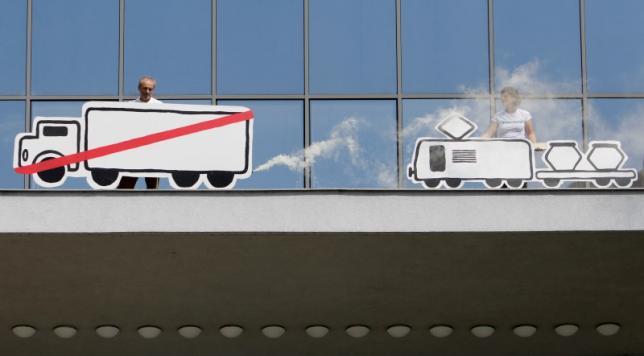European Union greenhouse gas emissions fell in 2014 to their lowest level since 1990, although the bloc said more diesel vehicles had increased carbon dioxide on its roads and significant cuts were needed.
The European Environment Agency (EEA) said on Tuesday that 2014’s 4.1 percent decline, which coincided with a 1.4 percent GDP rise, resulted from more renewables, better energy efficiency, the recession and milder winters.
Germany and Britain led the way, accounting together for some 45 percent of reductions at the EU level in 2014. The fall is in line with a pattern of declining emissions to an overall 24.4 percent over the 24-year period.
Hans Bruyninckx, head of the Copenhagen-based agency which collects data and advises EU policy-makers, said the 28-nation bloc was making progress toward its target of a 40 percent emissions reduction cut by 2030, compared with 1990 levels.
But to speed efforts toward a low-carbon future, he warned: “We need to further boost our investments in technology and innovation aimed at reducing our dependence on fossil fuels.”
While emissions decreased in most sectors, road transport accounted for the largest increase in CO2 pollution, growing by 124 million tonnes between 1990 and 2014. Despite improvements in vehicle fuel consumption, road transport made up some 20 percent of all EU greenhouse gas emissions in 2014.
For EU member states to meet their targets in sharing out the burden of cutting emissions in sectors not covered by the EU Emission Trading System, pollution from transport “would need to fall significantly”, the agency said in its annual report.
Volkswagen’s revelation in September that it used software to cheat tests on pollution limits in the United States has thrown a spotlight on vehicle emissions and spurred EU regulators to tighten testing.
The EEA also noted an increase in CO2 emissions from biomass combustion by 308 million tonnes over the period, highlighting the need for biomass to be produced in a sustainable way.
The EU executive will start the gun next month on what is expected to be a tough debate on the emission cuts to be taken by each member state for implementing the Paris Climate accord.
Legislative proposals on a policy for renewables and bioenergy is also expected by the end of year.
The EEA will publish early estimates for 2015 emissions later in the year.
Source: REUTERS











